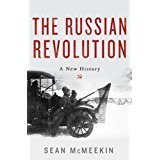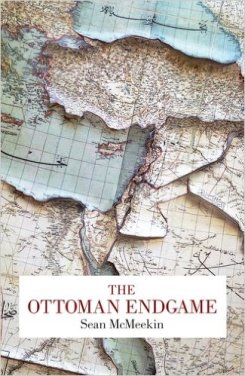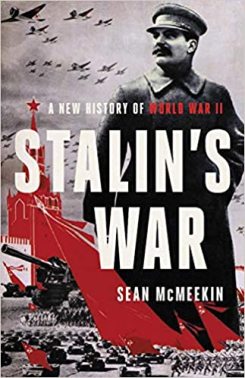Sean McMeekin Biography

Sean McMeekin was born in Idaho, raised in Rochester NY, and educated at Stanford and UC Berkeley. He has been fascinated by modern history ever since playing Winston Churchill in a school reenactment of the Yalta Conference at age 15, and Joseph McCarthy in an even more outlandish reenactment of the Army-McCarthy hearings at age 17, which involved camcorders and double agents in the Russian Club. He pursued this interest into various American and European battlefields, libraries, and archives, venturing as far east as Russia, before settling down to teach for some years in Turkey, where the weather is better. Since 2014, he has taught at Bard College in the Hudson Valley. He is the author of eight award-winning books, most recently Stalin’s War. A New History of World War II (Basic Books, 2021).
How I Found the Agency
I was contacted by an agent following the success of The Berlin-Baghdad Express, but we did not hit it off. I found the Lownie agency through Googling literary agents/history and was immediately impressed with the design of the webpage and the emphasis on non-fiction. I also noticed that the agency represented Roger Crowley, whose works I admire. Crowley, too, found the agency online, and said that he e-mailed his proposal to Andrew Lownie and heard back the next day. I did the same, and heard back the same afternoon.
Author News
-
McMeekin wins $10,000 book prize 27 Jan 2025
Congratulations to Sean McMeekin whose To Overthrow the World is the 2025 Conservative Book of the Year from the Intercollegiate Studies Institute
-
Twentieth century history sold to Basic 01 Aug 2024
Basic Books and John Murray have bought World English rights in Sean McMeekin’s The Long Retreat: A History of Europe and the World Since 1900
-
History of Communism to Hurst 04 Dec 2023
Hurst have bought UK & Commonwealth rights in Sean McMeekin’s To Overthrow the World: The Rise and Fall and Rise of Communism. Basic have North American rights.
-
Recent Foreign Rights sales 23 Jun 2023
Japanese rights in Sean McMeekin’sA History of Communism From Theory to Practice
Turkish rights in Sean McMeekin’s History’s Greatest Heist. : The Looting of Russia by the Bolsheviks
Greek and Chinese rights in Tony Spawforth’s What the Greeks did for us..
-
Recent Foreign Rights sales 16 Jul 2022
Swedish rights in Cathy Glass’s Too Scared to Tell and A Terrible Secret
Turkish rights in Sean McMeekin’s July 1914: Countdown to War and The Russian Revolution: A New History
Arabic rights in Geoff Roberts’ Stalin’s Library
-
Stalin's WAr short-listed 26 Apr 2022
Sean McMeekin’s Stalin’s War is one of seven titles shortlisted for this year’s Duke of Wellington Medal for Military History.
-
Revisionist book on Communism to Basic 23 Dec 2021
Basic have bought North American rights in Sean McMeekin’s revisionist history of Communism.
-
Praise for Stalin's War 23 Dec 2021
Stalin’s War has been included in The Federalist’s “Notable Books of 2021” roundup.
“Sean McMeekin’s revisionist Stalin’s War: A New History of World War II isn’t just one of the most compelling histories written about the war this year, it’s one of the best ever. I doubt anyone who reads it will think about the Second World War in the same way.”—David Harsanyi, The Federalist
-
History of Communism to Basic 19 Jul 2021
Basic have bought North American rights in Sean McMeekin’s revisionist A History of Communism From Theory to Practice.
-
Recent Foreign Rights sales 10 Jun 2021
Romanian rights in Catherine Hewitt’s The Mistress of Paris.
German rights in Sean McMeekin’s Stalin’s War: A New History of World War II.
Romanian rights in Daniel Tammet’s Born on a Blue Day.
-
Praise for Stalin's War 12 Jan 2021
Sean McMeekin’s revisionist history of World War Two , Stalin’s War,,published by Penguin and Basic in April has had starred reviews in Publishers Weekly and KIrkus
‘Yet another winner for McMeekin, this also serves as a worthy companion to Niall Ferguson’s The Pity of War, which argued that Britain should not have entered World War 1. Brilliant contrarian history.’ Kirkus
‘Packed with incisive character sketches and illuminating analyses of military and diplomatic maneuvers, this is a skilful and persuasive reframing of the causes, developments, and repercussions of WW11. ‘Publishers Weekly
Amongst the endorsements
‘McMeekin’s approach in Stalin’s War is both original and refreshing, written as it is with a wonderful clarity’. Antony Beevor
“Gripping, authoritative, accessible, and always bracingly revisionist.” Simon Sebag Montefiore
-
Recent Foreign Rights sales 22 Oct 2018
Bulgarian rights in The Girl With No Name: The Incredible True Story of the Girl Raised by Monkeys by Marina Chapman and Lynne Barrett-Lee.
Spanish rights in The Boy Who Followed His Father into Auschwitz by Jeremy Dronfield.
Chinese rights in The Russian Revolution: A New History by Sean McMeekin .
-
UK rights in Stalin's War to Penguin 02 Feb 2018
UK & Commonwealth rights , excluding Canada, in Sean McMeekin’s revisionist study Stalin’s War have been bought by Penguin.
-
Revisionist look at Second World War to Basic 22 Dec 2017
Basic have bought North American rights in Sean McMeekin’s revisionist look at the Second World War Stalin’s War .
-
Recent Foreign Rights sales 01 Jun 2017
Swedish rights in Cathy Glass’s Mummy Told Me Not to Tell.
Estonian rights in Sean McMeekin’s The Russian Revolution: A New History.
Spanish rights in Danny Orbach’s The Plots Against Hitler.
-
Advance Praise for The Russian Revolution by Sean McMeekin 07 Mar 2017
Some wonderful endorsements for Sean McMeekin’s ground-breaking new book.
“It is a quarter of a century since Richard Pipes published his history of the Bolshevik seizure of power in the Russian empire, and twenty years since Orlando Figes’s A People’s Tragedy. Back then, in the wake of the Soviet collapse, those seemed definitive. But now comes Sean McMeekin with a vivid new account, drawing on fresh evidence and offering an original, geopolitical perspective. The full, shocking extent to which Lenin was a German operative now becomes clear, as does the magnitude of Kerensky’s blunder in not finishing the Bolsheviks off before their “revolutionary defeatism” went viral. McMeekin writes muscular history. His Russian Revolution grips the reader.” —Niall Ferguson, senior fellow, the Hoover Institution, Stanford
“McMeekin enhances his high reputation in this comprehensively researched, persuasively developed account of the Russian Revolution as a contingent consequence of specific policies and decisions. Russia’s army, economy, and society did not collapse from the structural overstretch of World War I. Instead McMeekin emphasizes the might have beens, the roads not taken, that led to a “hostile takeover” standing as a grim warning against armed prophets promising earthly utopias.” —Dennis Showalter, professor of history, Colorado College
“This is a book that we have been waiting for. The Russian Revolution is an enormous subject, and to write a short and authoritative book on it is very difficult indeed. Sean McMeekin brings many gifts to the task, not the least of which is that he can describe crowd scenes with immediacy. It should count as a classic.” —Norman Stone, author of World War One
“In vivid colors, Sean McMeekin presents a provocative narrative of the 1917 Russian revolutions with an emphasis on the conspiracies, mutinies, and acts of treason behind the scenes of both revolutions. He shows how the revolutions were a direct result of Russia’s involvement in World War I in new ways. It is a book that will generate much debate.” —Eric Lohr, Susan Carmel Lehrman Chair of Russian History and Culture, American University
“The Tsar didn’t fall, he wilted, and this briskly written, fresh take on the revolution sketches the process in poignant detail—orgies, vodka, Rasputin, pogroms, plots, and war on the Eastern Front. McMeekin’s Lenin is more seedy than heroic, his Bolshevik victory an act of treason engineered by a German army that had stuffed a billion dollars in Lenin’s pockets before the bourgeois exile mounted his first barricade in Petrograd.” —Geoffrey Wawro, author of A Mad Catastrophe: The Outbreak of World War I and the Collapse of the Habsburg Empire
“Sean McMeekin’s new history of the Russian Revolution is, as always with his work, dynamic, compelling, and revisionist, telling the familiar story with vigour, accessibility, and elan but ornamented with fascinating new archival revelations on, amongst other things, German funding of the Bolsheviks.” —Simon Sebag Montefiore, author of The Romanovs
-
Sean McMeekin's new history of Russian Revolution sold to Profile 14 Nov 2016
Sean McMeekin’s revisionist account of the Russian Revolution, drawn from new archives, has been sold to Profile. Basic will publish in the US.
-
Recent Foreign Rights sales 08 Nov 2016
German rights in Duncan Falconer’s The Hostage.
Italian rights in Sean McMeekin’s The Ottoman Endgame: War, Revolution, and the Making of the Modern Middle East
Korean rights in Clare Mulley’s The Woman Who Saved the Children: A Biography of Eglantyne Jebb
-
The Ottoman Endgame shortlisted for 2015 Duke of Westminster Medal for Military Literature 16 Jun 2016
Sean McMeekin’s The Ottoman Endgame is one of six books shortlisted for the 2015 Duke of Westminster Medal for Military Literature . The final winner will be announced at the annual award ceremony in the autumn .
-
More great reviews for July 1914 18 Jan 2014
There have been two more great reviews for Sean McMeekin’s July 1914. History Today pairs Sean with Niall Ferguson and Barbara Tuchman as one of the most important historians of 1914.
And the New York Review of Books writes:
“Sean McMeekin’s chronicle of these weeks in July 1914: Countdown to War is almost impossible to put down…. [McMeekin] delivers a punchy and riveting narrative of high politics and diplomacy over the five weeks after Sarajevo, more or less day by day, dwelling on small groups of decision-makers in and between the various capitals, and their interactions, by turns measured, perplexed, cordial, artful, angry, even tearful.”
-
Jack Beatty reviews Sean McMeekin 16 Dec 2013
Sean McMeekin’s July 1914: Countdown to War has been warmly reviewed by Jack Beatty, senior editor of The Atlantic, and news analyst for NPR:
“When I saw July 1914: Countdown to War by Sean McMeekin in a book store, my heart sank. The “July Crisis” that followed the assassination of the Austrian Archduke, Franz Ferdinand, in Sarajevo and that ended in war is the most ploughed over episode in diplomatic history. Although by no means a scholar, I had read “The World Crisis, Volume I, 1911-1914″ by Winston Churchill, the two –volume history by Sidney Fay published in the 1920s, the documentary history edited by Immanuel Geiss published in the 1960s, and the three-volume opus by Luigi Albertini published in English in the 1950’s. Of more recent works, the diplomatic dance of death in Vienna, St. Petersburg, Berlin, Paris, and London occupies much of Hugh Strachan’s massive “The First World War Volume I: To Arms (2001)”, the first third of David Stevenson’s “Cataclysm: The First World War as Political Tragedy (2005),” and nearly all of “Decisions for War, 1914-1917 (2003),” edited by Richard H. Hamilton and Holger H. Herwig. How, I wondered in the bookstore, could there be anything new to say about the July Crisis? And how could Sean McMeekin, called the “leading young historian of modern Europe” by Norman Stone, how could the author of original works like The Russian Origins of the First World War and The Berlin-Baghdad Express–what was this imaginative, multilingual scholar doing spending his time on this stale subject? It took only a few pages of “July 1914″ to buoy my heart. McMeekin makes this old story new. His history reads like a novel. Better, it unfolds like a play. There is no “going behind,” as Henry James termed authorial interventions in a novel’s forward flow. There is no going ahead, either. Events happen in the text as they did in life. The historical actors don’t know the consequences of their acts; neither does the reader. The footfalls of the future echo only in the foreshadowings that end chapters: “As they awoke Monday, Bethmann and Jagow would have some quick thinking to do. News was flooding in from Belgrade, Vienna, Petersburg, Paris, and London. Almost none of it was what anyone in Berlin wanted to hear.” McMeekin adds dollops of fresh savory fact on every page. More importantly, he sees the whole crisis unclouded by bias for or against his characters or their countries. He saves moral judgment for the end. “When we examine the key moral question of 1914–responsibility for the outbreak of European, then world war—it is important to keep degrees of responsibility in mind. Sins of omission are lesser ones than sins of commission: likewise, actions are not equivalent to the reactions they occasion.” That last observation is characteristic of McMeekin’s subtle turn of mind. He applies it exquisitely in assessing blame for the war. Serbia, the source of the plot to kill the Archduke, stands first “in the dock of judgment.” Next Austria-Hungary, for its reckless escalation of the crisis. Next Germany, for giving Austria the notorious “blank check” to attack Serbia. Closely behind is Serbia’s protector, Russia: “The decision for European war was made by Russia on the night of 29 July 1914, when Tsar Nicholas II, advised unanimously by his advisers, signed the order of general mobilization. General mobilization…meant war.” Next France, for goading Russia on, and for…well, enough. ”July 1914″ is superb history and compelling reading.”
-
Huge coverage for Sean McMeekin 10 Dec 2013
Sean McMeekin’s July 1914: Countdown to War has been widely reviewed and praised, and was named by Kirkus as one of the best non-fiction books of 2013. Other reviews and coverage include:
New York Times review Publishers Weekly starred review National Review ABC interview Kirkus review FT review Historically Speaking interview …and many more.
“[M]asterful.” —Washington Times
“[McMeekin is] a young, talented historian…. [He] is scrupulously fair and judicious in assigning blame…. McMeekin has written a fascinating and original study of the opening stages of World War I, a book that supersedes, in my view, any previous study of that great topic.” —John P. Rossi, Philadelphia Inquirer
“The historiography of World War I is immense, more than 25,000 volumes and articles even before next year’s centenary. Still, … Sean McMeekin, in July 1914, [offers a] new perspective…. McMeekin has chosen the zoom lens. He opens with a crisp but vivid reconstruction of the double murder in the sunshine of Sarajevo, then concentrates entirely on unraveling the choreography day by day.” —Harold Evans, New York Times Book Review
“[A] superbly researched political history of the weeks between the assassination of Austria’s Archduke Franz Ferdinand and the beginning of World War I…. McMeekin’s work is a fine diplomatic history of the period, a must-read for serious students of WWI, and a fascinating story for anyone interested in modern history.” —Publishers Weekly, starred review
“Lucid, convincing and full of rich detail, the book is a triumph for the narrative method and a vivid demonstration that chronology is the logic of history.” —The Independent (UK)
-
Terrific reviews for two agency titles 31 Jul 2013
There were two great reviews for agency books in Saturday’s Times:
"A work of meticulous scholarship…" Roy Hattersley on Sean McMeekin’s July 1914
"James, an expert chronicler of imperial history, shows how Churchill never wavered from his belief that the Empire was “a precious asset, not just for Britain, but for civilisation as a whole”. He analyses from this perspective the whole of Churchill’s career, bringing fresh insights even to oft-examined episodes such as the Boer War and Gallipoli. One of the many strengths of his magisterial survey, based on extensive research in primary sources — especially the records of the intelligence services — is its objectivity…. The portrait of the final years is both compelling and sad, as Churchill had unwillingly to come to terms with the fact that, “however loudly the lion roared, it needed America’s permission to pounce”. James has written a pioneering biography of Churchill from a central, specific point of view that reveals his strengths and weaknesses in an entirely new light. It will be of abiding interest to all those concerned with Britain’s past and how it influenced the world in which we live today. " DR Thorpe on Lawrence James’s Churchill and Empire
-
Great reviews for Sean McMeekin 28 Jan 2013
Sean McMeekin’s latest book July 1914: Countdown to War is getting terrific reviews, including the following:
“[A] superbly researched political history of the weeks between the assassination of Austria’s Archduke Franz Ferdinand and the beginning of World War I…. McMeekin’s work is a fine diplomatic history of the period, a must-read for serious students of WWI, and a fascinating story for anyone interested in modern history.” Publishers Weekly
“[A] thoroughly rewarding account that spares no nation regarding the causes of World War I…. McMeekin delivers a gripping, almost day-by-day chronicle of the increasingly frantic maneuvers of European civilian leaders who mostly didn’t want war and military leaders who had less objection.” KIrkus Reviews
“Sean McMeekin is establishing himself as a—or even the—leading young historian of modern Europe. Here he turns his gifts to the outbreak of war in July 1914 and has written another masterpiece.” Norman Stone, author of World War Two: A Short History
“This is a meticulously researched and vividly written reconstruction of the decisions that led to war in July 1914. McMeekin captures the human drama of this fateful month and offers a provocative assessment of the different players’ moral responsibility.” James Sheehan, author of Where Have All the Soldiers Gone?: The Transformation of Modern Europe
“Winners write the histories, so wars are misunderstood. Sean McMeekin takes a wider stance to get a fresh angle of vision on The Great War, and casts all war-making in a new light.” Charles Hill, Diplomat in Residence at Yale University, Research Fellow at the Hoover Institution, and author of Trial of a Thousand Years: World Order and Islamism
“Sean McMeekin has given us a riveting and fast-paced account of some of the most important diplomatic and military decisions of the 20th century. He depicts with chilling clarity the confusion, the incompetence, and the recklessness with which Europe’s leaders went to war in that fateful summer. Any understanding of the world we inhabit today must begin with an examination of the events of July 1914. McMeekin provides his readers with a balanced and detailed analysis of the events that gave birth to the modern age.” Michael Neiberg, author of The Blood of Free Men

Author Details:
- Follow Sean McMeekin on Twitter @









